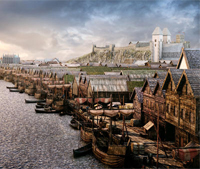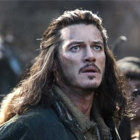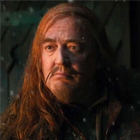The text below is from the [ original novel ].
- Which parts of the video are the same as the novel?
- Which parts of the video are different from the novel?
- Which parts of the novel are not in the video?
“Well! Here we are!” said Thorin. “And I suppose we ought to thank our stars and Mr. Baggins. I am sure he has a right to expect it, though I wish he could have arranged a more comfortable journey. Still—all very much at your service once more, Mr. Baggins. No doubt we shall feel properly grateful, when we are fed and recovered. In the meanwhile what next?”
“I suggest Lake-town,” said Bilbo. “What else is there?”
Nothing else could, of course, be suggested; so leaving the others Thorin and Fili and Kili and the hobbit went along the shore to the great bridge. There were guards at the head of it, but they were not keeping very careful watch, for it was so long since there had been any real need. Except for occasional squabbles about river-tolls they were friends with the Wood-elves. Other folk were far away; and some of the younger people in the town openly doubted the existence of any dragon in the mountain, and laughed at the greybeards and gammers who said that they had seen him flying in the sky in their young days. That being so it is not surprising that the guards were drinking and laughing by a fire in their hut, and did not hear the noise of the unpacking of the dwarves or the footsteps of the four scouts. Their astonishment was enormous when Thorin Oakenshield stepped in through the door.
“Who are you and what do you want?” they shouted leaping to their feet and groping for weapons.
“Thorin son of Thrain son of Thror King under the Mountain!” said the dwarf in a loud voice, and he looked it, in spite of his torn clothes and draggled hood. The gold gleamed on his neck and waist; his eyes were dark and deep. “I have come back. I wish to see the Master of your town!”
Then there was tremendous excitement. Some of the more foolish ran out of the hut as if they expected the Mountain to go golden in the night and all the waters of the lake turn yellow right away. The captain of the guard came forward.
“And who are these?” he asked, pointing to Fili and Kili and Bilbo.
“The sons of my father’s daughter,” answered Thorin, “Fili and Kili of the race of Durin, and Mr. Baggins who has travelled with us out of the West.”
“If you come in peace lay down your arms!” said the captain.
“We have none,” said Thorin, and it was true enough: their knives had been taken from them by the wood-elves, and the great sword Orcrist too. Bilbo had his short sword, hidden as usual, but he said nothing about that. “We have no need of weapons, who return at last to our own as spoken of old. Nor could we fight against so many. Take us to your master!”
“He is at feast,” said the captain.
“Then all the more reason for taking us to him,” burst in Fili, who was getting impatient at these solemnities. “We are worn and famished after our long road and we have sick comrades. Now make haste and let us have no more words, or your master may have something to say to you.”
“Follow me then,” said the captain, and with six men about them he led them over the bridge through the gates and into the market-place of the town. This was a wide circle of quiet water surrounded by the tall piles on which were built the greater houses, and by long wooden quays with many steps and ladders going down to the surface of the lake. From one great hall shone many lights and there came the sound of many voices. They passed its doors and stood blinking in the light looking at long tables filled with folk.
“I am Thorin son of Thrain son of Thror King under the Mountain! I return!” cried Thorin in a loud voice from the door, before the captain could say anything.
All leaped to their feet. The Master of the town sprang from his great chair. But none rose in greater surprise than the raft-men of the elves who were sitting at the lower end of the hall. Pressing forward before the Master’s table they cried:
“These are prisoners of our king that have escaped, wandering vagabond dwarves that could not give any good account of themselves, sneaking through the woods and molesting our people!”
“Is this true?” asked the Master. As a matter of fact he thought it far more likely than the return of the King under the Mountain, if any such person had ever existed.
“It is true that we were wrongfully waylaid by the Elvenking and imprisoned without cause as we journeyed back to our own land,” answered Thorin. “But lock nor bar may hinder the homecoming spoken of old. Nor is this town in the Wood-elves’ realm. I speak to the Master of the town of the Men of the Lake, not to the raft-men of the king.”
Then the Master hesitated and looked from one to the other. The Elvenking was very powerful in those parts and the Master wished for no enmity with him, nor did he think much of old songs, giving his mind to trade and tolls, to cargoes and gold, to which habit he owed his position. Others were of different mind, however, and quickly the matter was settled without him. The news had spread from the doors of the hall like fire through all the town. People were shouting inside the hall and outside it. The quays were thronged with hurrying feet. Some began to sing snatches of old songs concerning the return of the King under the Mountain; that it was Thror’s grandson not Thror himself that had come back did not bother them at all. Others took up the song and it rolled loud and high over the lake.
The King beneath the mountains,
The King of carven stone,
The lord of silver fountains
Shall come into his own!
His crown shall be upholden,
His harp shall be restrung,
His halls shall echo golden
To songs of yore re-sung.
The woods shall wave on mountains
And grass beneath the sun;
His wealth shall flow in fountains
And the rivers golden run.
The streams shall run in gladness,
The lakes shall shine and burn,
All sorrow fail and sadness
At the Mountain-king’s return!
So they sang, or very like that, only there was a great deal more of it, and there was much shouting as well as the music of harps and of fiddles mixed up with it. Indeed such excitement had not been known in the town in the memory of the oldest grandfather. The Wood-elves themselves began to wonder greatly and even to be afraid. They did not know of course how Thorin had escaped, and they began to think their king might have made a serious mistake. As for the Master he saw there was nothing else for it but to obey the general clamour, for the moment at any rate, and to pretend to believe that Thorin was what he said.
So he gave up to him his own great chair and set Fili and Kili beside him in places of honour. Even Bilbo was given a seat at the high table, and no explanation of where he came in—no songs had alluded to him even in the obscurest way—was asked for in the general bustle.
Soon afterwards the other dwarves were brought into the town amid scenes of astonishing enthusiasm. They were all doctored and fed and housed and pampered in the most delightful and satisfactory fashion. A large house was given up to Thorin and his company; boats and rowers were put at their service; and crowds sat outside and sang songs all day, or cheered if any dwarf showed so much as his nose.
[ printable .pdf ]
 English
English Português
Português Español
Español 한국어
한국어



